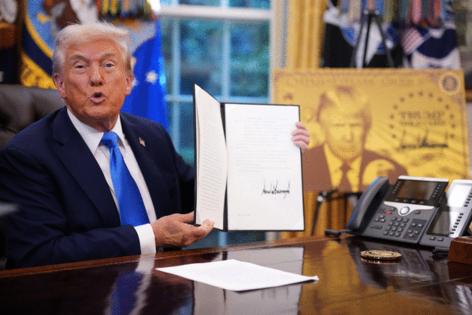Trump to add new $100,000 fee for H-1B visas in latest crackdown
Published in Political News
WASHINGTON — President Donald Trump signed a proclamation Friday that would move to extensively overhaul the H-1B visa program, requiring a $100,000 fee for applications in a bid to curb overuse.
The proclamation requires the payment and asserts that abuse of the H-1B pathway has displaced U.S. workers. The proclamation restricts entry under the H-1B program unless accompanied by the payment.
The move will require a “$100,000 payment to accompany or supplement H-1B petitions for new applications,” according to a White House fact sheet. That payment would be in addition to current fees, which are more modest. Fees directly tied to the H-1B visa application currently include a $215 fee to register for the lottery alongside various filing fees.
Bloomberg News earlier reported on the administration’s plans to require the fee for applicants.
Trump’s proclamation allows for case-by-case exemptions if in the national interest — opening a potential window for certain companies or industries to seek a workaround from the new fee.
Trump also plans to order the Labor Secretary to undertake a rulemaking process to revise prevailing-wage levels for the H-1B program — a move intended to limit the use of visas to undercut wages that would otherwise be paid to American workers.
Accenture, Cognizant Technology and other IT consulting stocks hit session lows on Friday on the news of the visa fee.
The move is the latest immigration reform by the Trump administration and will affect the technology industry in particular, as it relies heavily on H-1Bs. The administration argues that the revisions will bring more certainty to legitimate filings under the program by weeding out abuses.
Trump brushed off a question about whether technology company executives would be concerned with the action.
“I think they’re going to be very happy. Everyone’s going to be happy. And we’re going to be able to keep people in our country that are going to be very productive people,” Trump said on Friday. “And in many cases these companies are going to pay a lot of money for that and they’re very happy about it.”
In the fact sheet, the White House said American workers are being replaced with lower-paid foreign labor and called it a national security threat. The dynamic is suppressing wages and disincentivizing Americans from choosing careers in STEM fields, the White House said.
H-1B visas are awarded based on a lottery system, but Bloomberg News has reported previously that flaws in the system created loopholes that some employers have exploited by flooding the lottery with entries. The U.S. in recent years has changed the lottery process in a bid to reduce the ability to game its outcomes, and the Trump administration is weighing further changes to the way applications are considered.
Unlike large tech companies, these companies often use the visa program to hire lower-paid workers — and do so indirectly, through staffing and outsourcing companies that have previously been able to capture about half of the 85,000 new visas allocated each year.
The administration’s policy shift unfolds alongside a wave of fee increases for work permits, asylum applications and humanitarian protections stipulated in the president’s tax bill, in a bid to raise revenue to pay for funding for new detention centers, hiring thousands of immigration agents, and expanding border wall construction.
Immigration, one of Trump’s key campaign issues, has been a source of division among key factions of his base. Last winter, that rift spilled into the public, with Elon Musk and Vivek Ramaswamy, who were tapped to run a government efficiency effort, arguing on social media with more conservative members of the MAGA base on the importance of H-1B visas. Musk and Ramaswamy have argued that U.S. companies needed to recruit top talent from across the world to remain competitive. Trump largely stayed out of the fight.
But Trump’s legal and illegal immigration crackdown has already started to affect population and economic projections. Economists have already questioned whether tighter U.S. immigration controls are undercutting U.S. job growth, and a recent CBO estimate projected higher inflation and unemployment this year and slower economic growth, in part because of lower net immigration because of his policies.
U.S. Citizenship and Immigration Services Director Joseph Edlow, who was confirmed in July, has outlined plans to curb work authorization for immigrants, and said USCIS officers would be encouraged to apply tougher scrutiny to those seeking benefits.
Speaking at an event at the National Press Club earlier this month, Edlow said that the H-1B system with the proper scrutiny and monitoring “can be a useful tool,” especially for employers and high wage earners.
“But my big concern – and it will always be my big concern – is keeping U.S. citizens – the way that it’s keeping U.S. citizens out of the job market, especially those graduating from universities with STEM degrees and their being kept out because employers are able to get higher – more experienced individuals at lower wage rates using the current four-tier wage levels.”
Traditionally, changes to fee structures come out of USCIS regulations that require notice-and-comment rulemaking or legislation passed by Congress.
(Marie Patino contributed to this report.)
©2025 Bloomberg L.P. Visit bloomberg.com. Distributed by Tribune Content Agency, LLC.
























































Comments